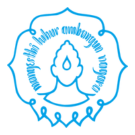Contextual Effect of Community Health Center and Other Determinants of Midwife Performance in the Implementation in the Prevention Mother to Child Transmission Counselling and Testing: A Multilevel Model Evidence
Abstract
Background: High transmission of HIV from mother to child can contribute to an increase in the number of pandemic events. Transmission of HIV from mother to baby can be prevented by the PMTCT (Prevention of Mother to Child HIV Transmission) program. The purpose of this study is to analyze the implementation of PMTCT program policies by midwives.
Subjects and Method: The design used in this study was observational analytic with cross sectional approach. The number of samples is 184 subjects. The sampling was done using total sampling. The independent variables included midwives' knowledge, midwife's age, job satisfaction, team performance, work environment, community support, training, and length of work. Meanwhile, the dependent variable is the implementation of PMTCT policies. Variable data collection was performed using a questionnaire and analyzed using multilevel analysis with Stata 13.
Results: The implementation of PMTCT policies increased influenced by period of working ≥8 years (b= 0.50; 95% CI= 0.61 to 0.85; p= 0.004), training ≥2 times (b= 0.44; 95% CI= -0.13 to 0.76; p= 0.005), good midwife knowledge (b= 0.65; 95% CI= 0.36 to 0.93; p<0.001), midwife satisfaction is good (b= 0.05; 95% CI= -0.21 to 0.31; p= 0.694), and midwife performance is good (b= 0.59; 95% CI= 0.25 to 0.93; p= 0.001). The implementation of PMTCT policies decreased influenced by bad working environment (b= -0.09; 95% CI= -0.36 to 0.16; p= 0.451), age ≥35 years (b= -0.51; 95% CI= -0.80 to -0.24; p<0.001), and small community support (b= -0.06; 95% CI= -0.38 to 0.25; p= 0.692). Public health ceneters have weak contextual influence on the implementation of PMTCT program policies with ICC= 6.6%.
Conclusion:The midwife's period of work, knowledge, training, midwife's performance, and midwife's satisfaction improve PMTCT implementation. Whereas midwives' age, work environment and community support reduce PMTCT implementation
Keywords: HIV / AIDS, implementation of PMTCT, multiple linear regression analysis.
Correspondence:
Sringatin, Dolopo Regional Public Hospital, Madiun, East Java. Jl. Raya Dolopo no.117 Dolopo, Madiun 63174, East Java. Email: sringatine22@gmail.com. Mobile: 081231683090
Journal of Health Policy and Management (2020), 5(1): 35-47
https://doi.org/10.26911/thejhpm.2020.05.01.04
How to Cite
References
Hurst SA, Appelgren KE, Kourtis AP. (2015). Prevention of mother-to-child transmission of HIV Type 1: The role of neonatal and infant prophylaxis. Expert Rev AntiInfect Ther, 13(2): 169–181. https://doi.org/10.1586/14787210.2015.999667
Dugguh S, Dennis A. (2014). Job satisfaction theories: Traceability to employee performance in organizations. IOSR Journal of Business and Management, 16(5): 11–18. https://doi.org/10.9790/487x16511118
Ministry of Health RI (2014). Undang-Undang No. 36 Tentang Tenaga Kesehatan.Ministry of Health RI, (1): 2. Retrieved from http://gajiroum.kemkes.go.id/gaji-roum/data/UU_NO_36_2014.pdf
MbarukuGM, Larson E, Kimweri A, Kruk ME (2014). What elements of the work environment are most responsible for health personnels dissatisfaction in rural primary care clinics in Tanzania,12(1): 1–9. https://doi.org/10.1186/1478-4491-12-38
Nkwabong E, Nguel RM, Kamgaing N, Sylvie A, Jippe K (2018). Knowledge, attitudes and practices of health personnel of maternities in the prevention of mother-to-childtrans-mission of HIV in a sub-Saharan African region with high transmission rate: some solutions proposed. 1–6. https://doi.org/10.1186/s12884-018-1876-0
Nsubuga S, Meadway J, Olupot-olupot P (2019). A study using knowledge, attitude and practices on the prevention of HIV-1 vertical transmission with outcomes in early infant HIV-1 diagnosis inEastern Uganda. 102-108. https://www.ncbi.nlm.nih.gov/pubmed/31191913.
Read JS, Havens P, Emmanuel P, Flynn P, Henry-Reid L, Hoyt L, et al. (2007). Diagnosis of HIV-1 infection in children younger than 18 months in the United States. Pediatrics, 120(6). https://doi.org/10.1542/peds.20072951
Schuster RC, Sousa O De, Rivera J, Olson R, Pinault D (2016). Performance-based incentives may be appropriate to address challenges to delivery of prevention of vertical transmission of HIV services in rural Mozambique: a qualitative investigation. Human Resources for Health. https://doi.org/10.1186/s12960-016-0157-0
Smith SL, Chahroudi AM, Camacho-gonzalez AF, Gillespie
S, Wynn BA, Badell ML, et al. (2018). Evaluating facility infrastructure for prevention of mother-tochild transmission of HIV-A 2015 Assessment of Major Delivery Hospitals in Atlanta, Georgia. J Pediatric Infect Dis Soc. 2018; 7(3): e102–e106. https://doi.org/10.1093/jpids/piy058
Sulaeman ES (2014). Manajemen kesehatan teori dan praktik di Public Health Centers (3rd ed) (Health management theory and practice at Public Health Centers (3rd ed). Yogyakarta: Gadjah Mada University Press.
Topp SM, Chipukuma JM, Hanefeld J (2015). Understanding
the dynamic interactions driving Zambian health centre performance: a case-based health systems analysis. Health Policy Plan. https://doi.org/10.1093/heapol/czu029
Widjajanti M (2016). Evaluasi program prevention of mother to child HIV Transmission(PMTCT) di RSAB Harapan Kita Jakarta (Evaluation of HIV Transmission (PMTCT) prevention of mother to child program at RSAB Harapan Kita Jakarta). Sari Pediatri, 14(3): 167. https://doi.org/10.14238/sp14.3.2012.167-72





